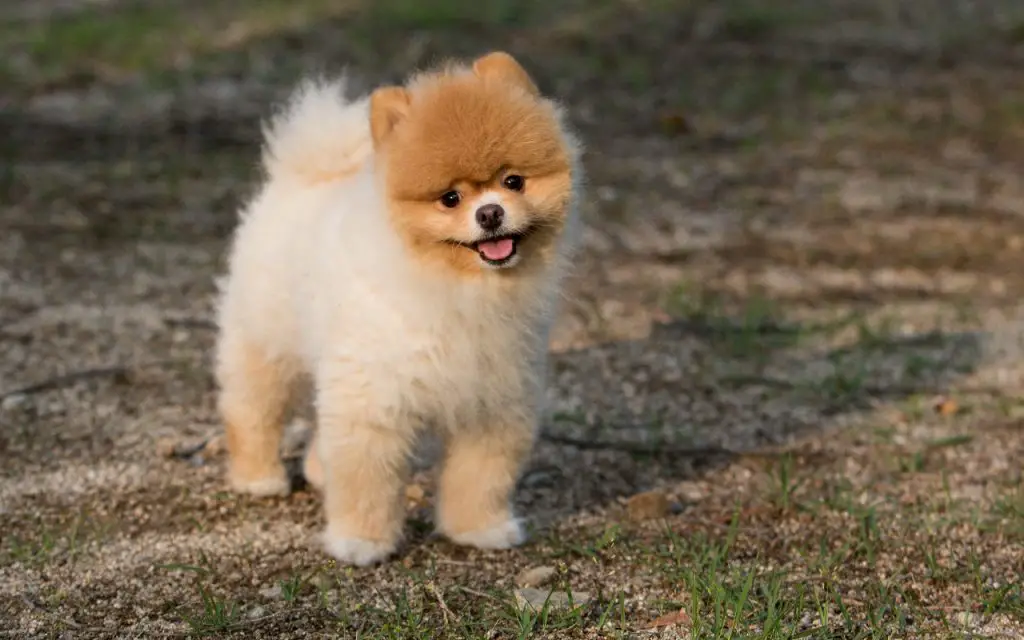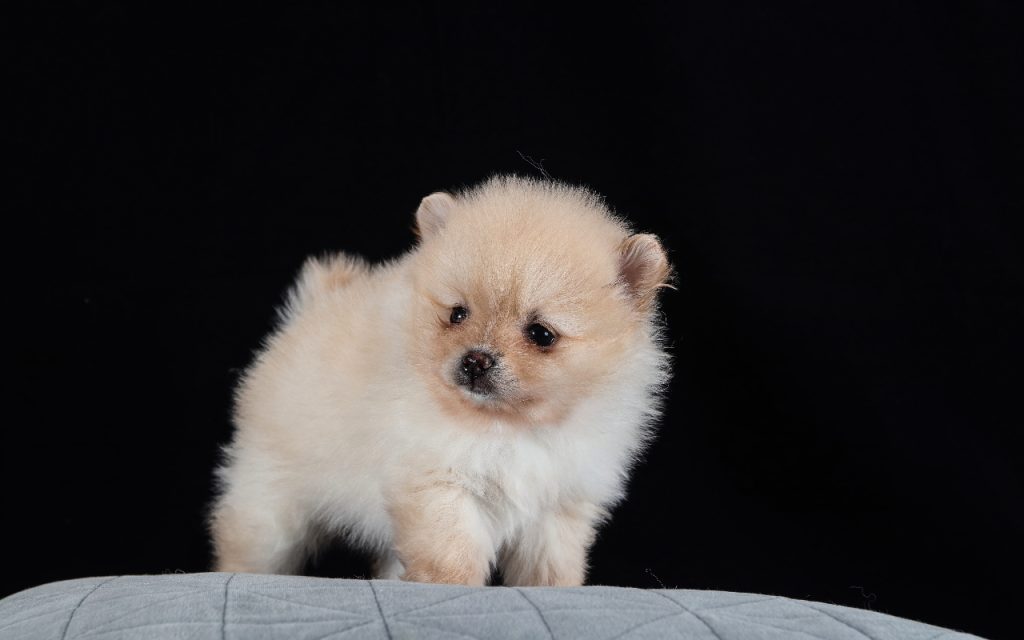If you’re the proud owner of a Pomeranian, then you know that these little dogs can be quite the handful. They are adorable, but they also require a lot of attention and care. One question that many Pomeranian owners have is how often their dog should poop.
In this comprehensive guide, we will answer that question and provide you with all the information you need to keep your furry friend healthy and happy!
Key Takeaway
- A healthy Pomeranian typically poops once a day, but it can vary from one to three times a day depending on their diet and lifestyle.
- A Pomeranian can generally hold its bladder for one hour per month of their age up to a maximum of twelve hours, and puppies between eight and twelve weeks can usually hold their poop for about two hours.
- If your Pomeranian is constipated, you can give them a bit of pumpkin or psyllium-based fiber supplements, but if the problem persists, a visit to the vet may be necessary for a potential prescription of a laxative or an enema.
How Often Does a Pomeranian Poop?

A healthy Pomeranian typically poops once a day. However, some may go up to three times a day, while others may only poop once every other day. As with most things related to dogs, it is important to pay attention to your individual dog’s needs and adjust accordingly.
If you think your Pomeranian is not pooping enough, or if they are straining or having difficulty going, talk to your veterinarian. They may need a change in diet or medication that can help regulate their bowel movements.
Pomeranians have small intestines that are very short, which means that they digest food quickly and pass waste products soon afterward. In addition, Pomeranians have a high metabolism and tend to eat more than other breeds of dogs.
All of that food processing creates a lot of waste products that need to be eliminated regularly. Pomeranians often drink a lot of water, which also contributes to frequent bathroom trips.
If your Pomeranian is going more than three days without pooping, it’s worth taking them to the vet for a check-up. Constipation in dogs can be dangerous and may require medication or dietary changes to correct.
Dogs of all shapes and sizes enjoy spending time outdoors taking care of their business, but the way they go about doing their thing can differ greatly. For example, large dogs typically take longer to poop than small dogs, due to their size. This is because it takes more time for their intestines to process food.
On the other hand, small dogs are more prone to pooping in quick succession, as a result of having shorter intestines. Additionally, small dogs are also more likely to squat and pee simultaneously – something that big dogs find much harder to do.
Does Pomeranian Poop a Lot?

When compared to large dog breeds, then yes, Pomeranians do poop a lot. However, they have a smaller stomach capacity than large dogs which means that they need to poop more often in order to digest their food properly.
Another reason could be that Pomeranians are bred to have high energy levels, and as a result, they eat more than larger breeds. This means their digestive system is working harder to break down all that food, which leads to more pooping!
Generally speaking, though, smaller dogs like Pomeranians tend to poop more than larger dogs. This is because their digestive tracts are shorter, and so they process food more quickly.
That being said, all dogs will poop at least once a day, but a Pomeranian can go up to three times a day.
A good rule of thumb is to let your Pomeranian out once for every meal they eat, plus once in the morning and once at night. So if your Pomeranian eats two meals per day, you should let them out four times per day.
There are a few instances in which a Pomeranian might poop more than usual. If your Pom has been eating a lot of table food or treats, he may have an upset stomach and subsequently, diarrhea.
Additionally, if your dog is anxious or fearful, he may “hold it” in as long as possible and then release all his pent-up pee and poop at once when finally given the opportunity.
Finally, puppies often have trouble controlling their bowels until they’re about four months old; during this time they may poop up to eight times per day says Pomeranian Org.
How Many Times Does a Pomeranian Puppy Poop?

A Pomeranian puppy usually poops three times a day. However, this may vary depending on the diet and the age of the puppy. Younger puppies tend to poop more often than older puppies.
When you first bring your new Pomeranian puppy home, keep a close eye on how often he or she is going to the bathroom. This will help you determine a good routine for taking your puppy out for potty training.
Pomeranian puppies are notorious for pooping more than other dog breeds. While all puppies produce an abundance of poop, Poms seem to take the cake.
There are a few reasons that could contribute to Pomeranian puppies’ propensity for frequent potty breaks.
First, their small size means that they eat and drink less than larger breeds, resulting in firmer stools.
Second, their high energy level causes them to excrete more waste as they burn off calories.
And lastly, their long coats can trap moisture and bacteria close to the skin, leading to more frequent bouts of diarrhea.
Here are a few more tips for helping to control your Pomeranian puppy’s potty frequency:
- Make sure your pup has plenty of water to drink throughout the day.
- Take your puppy outside frequently, especially after meals and naps.
- If you cannot take your pup outside, provide them with a designated potty area indoors that is covered in pee pads or newspapers. Be sure to praise them when they go in the right spot!
- Start training your pup as early as possible on how to signal that they need to go potty. Some common cues include whining, scratching at the door, or standing next to you and looking up at you with a pleading expression.
- Be patient and consistent with your pup as they learn how to control their bladders. It may take a little while for them to get the hang of it!
How Long Can a Pomeranian Hold Its Poop and Pee?
Pomeranian puppies between the ages of eight and twelve weeks old usually can hold their poop and pee for two hours or so. Between three and six months old, puppies usually need to go outside every four hours or so.
Once a Pomeranian reaches seven months old, it can typically hold it for up to six hours at a time. An adult Pomeranian can hold its poop and pee for about twelve hours.
In the early weeks of a puppy’s life, its bladder is developing so it can hold its pee. A small dog’s bladder can hold around .05-.07 quarts while a large breed dog’s bladder can hold up to about .50 quarts. Bladder capacity does not stop growing at birth though.
It continues to grow and develop until the dog is about 18 months old. This is why puppies and young dogs have a tendency to pee more often than adult dogs.
A small dog’s intestines are not as long as a large dog’s intestines. This means that they can’t hold as much poop, so their intestines have to develop differently so they can hold their poop.
Their intestines also have to develop differently so they can digest food better. This is why small dogs often eat more than large dogs because they need the extra energy to help them digest their food.
What Can I Give My Constipated Pomeranian?
One thing that you can try is giving them water or apple cider vinegar. You can also give them pumpkin puree or mineral oil. Apple cider vinegar is a natural laxative and can help relieve constipation in dogs. It helps to soften the stools and increase their frequency.
To give your Pomeranian apple cider vinegar for constipation, add one teaspoon of apple cider vinegar per ten pounds of body weight to their food once a day. If your dog doesn’t like the taste of apple cider vinegar, you can also mix it with water or chicken broth.
Constipation is a common problem in dogs and can be caused by many different things, including diet, lack of exercise, age, and intestinal obstruction. If your dog is having trouble going number two, it’s important to get them checked out by a veterinarian to rule out any serious problems.
Pumpkin seeds are another great natural remedy for constipation in dogs. There are numerous benefits of pumpkins for dogs. Pumpkin seeds, in particular, can help with a dog’s constipation. Pumpkin seeds are high in fiber, which helps to regulate digestion and promote regularity. They also contain essential fatty acids and minerals like zinc and magnesium, which are beneficial for overall health.
Minerals oil can also help your dog’s constipation because it is a natural laxative. It helps to soften the stool and makes it easier to pass. Minerals oil can also help to lubricate the intestines, which can help to prevent constipation in the future.
If your dog is experiencing chronic constipation, you may want to consider switching to high-quality dog food that is specifically designed for dogs with digestive problems. You should also make sure that your dog gets plenty of exercise, as this can help keep their bowels moving regularly.
FAQs
Q: What factors can affect a Pomeranian’s potty schedule?
A: Several factors can influence how often a Pomeranian poops, including their diet, age, activity level, and overall health. It is important to monitor any changes in their bathroom habits as it can be indicative of a health issue.
Q: Is it normal for a Pomeranian to poop less frequently?
A: Pomeranians can have variations in their bathroom habits, and it is considered normal for them to poop less frequently under certain circumstances. For example, if they have recently eaten less or if they are experiencing constipation, they may have fewer bowel movements.
Q: How can I know if my Pomeranian is constipated?
A: Signs of constipation in a Pomeranian may include straining while trying to poop, having dry and hard stools, decreased appetite, and lethargy. If you notice any of these symptoms, it is best to consult with a veterinarian for proper guidance.
Q: What can I do to prevent constipation in my Pomeranian?
A: To prevent constipation in a Pomeranian, you can incorporate high-fiber foods into their diet, ensure they stay hydrated, provide regular exercise, and establish a consistent potty routine. If the issue persists, consult with a vet for personalized recommendations.
Q: Can certain foods cause more frequent bowel movements in Pomeranians?
A: Yes, some foods are known to have a laxative effect on dogs and may result in more frequent bowel movements. Examples of such foods include pumpkin, sweet potatoes, and certain types of high-fiber dog food. However, it is important to introduce new foods gradually and monitor your Pomeranian’s reaction.
Q: How long should I wait before getting concerned about my Pomeranian’s lack of bowel movements?
A: Every dog is different, but if your Pomeranian has not had a bowel movement for more than 48 hours, it is advisable to consult with a veterinarian. They will be able to evaluate the situation and provide appropriate guidance.
Q: Can stress or anxiety affect a Pomeranian’s bathroom habits?
A: Yes, stress or anxiety can have an impact on a Pomeranian’s bathroom habits. Some dogs may experience changes in their bowel movements, including diarrhea or constipation, when they are feeling stressed or anxious. If you suspect this to be the case, it is important to address the underlying cause and provide a calm environment for your Pomeranian.
Q: Are there any specific medical conditions that can affect a Pomeranian’s potty schedule?
A: Yes, certain medical conditions can influence a Pomeranian’s potty schedule. Examples include gastrointestinal disorders, food allergies or intolerances, and urinary tract infections. If you suspect your Pomeranian has a medical issue, it is best to consult with a veterinarian for a proper diagnosis and treatment plan.
Q: How can I establish a regular potty routine for my Pomeranian?
A: To establish a regular potty routine for your Pomeranian, take them outside to the designated potty area at consistent times throughout the day, such as after meals or after waking up. Be patient and give them plenty of time to do their business. Praise and reward them when they successfully poop in the right place to reinforce the desired behavior.
Conclusion and final thoughts
In conclusion, Pomeranians are known for their small size and adorable appearance.
However, they also have a reputation for being high-maintenance dogs due to their grooming needs and health issues.
One aspect that is often overlooked when considering adopting a Pomeranian is their bathroom habits.




